Plunge into the depths of Noah's era to uncover ancient warnings and promises that echo profoundly in today's world.
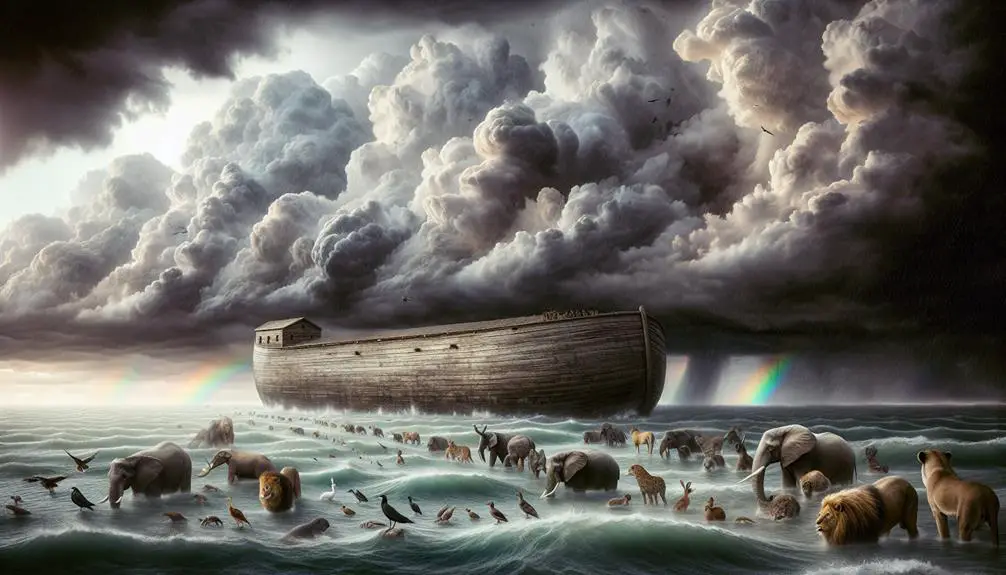
Bible as in the Days of Noah
Imagine the world as a canvas, darkened by storms and illuminated by arcs of divine judgment and promise, much like in the days of Noah. You're standing at the precipice of understanding, looking back to grasp what those times might teach us today.
The story of Noah isn't just a tale of survival; it's a mosaic of faith, divine warnings ignored, and a covenant that extends beyond the floodwaters. As we navigate through these reflections, you'll find that the lessons gleaned are not just historical footnotes but vital signposts for our journey.
The question remains: how closely does our current era mirror those ancient times?
Key Takeaways
- Modern challenges echo Biblical times, urging obedience and faith amidst global crises.
- Noah's story highlights the importance of divine warnings for transformation and redemption.
- Stewardship and sustainable living are critical, reflecting Noah's caretaking role.
- Faith and resilience are essential in navigating ethical and moral dilemmas today.
The Story of Noah
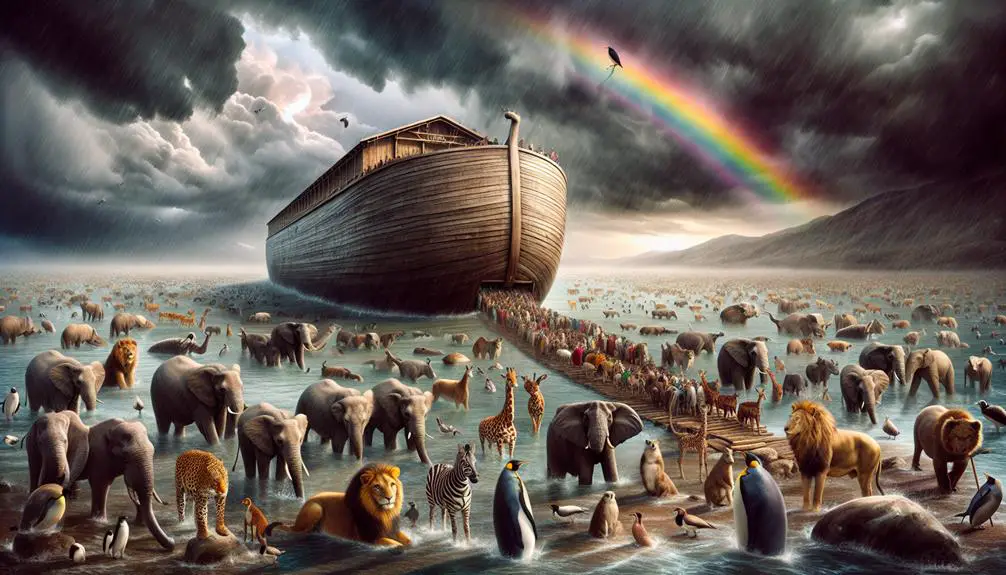
In analyzing the biblical narrative, Noah's story emerges as a pivotal moment where divine judgment and human morality intersect, illustrating a complex interplay between obedience, faith, and divine intervention. This narrative, deeply embedded within the fabric of religious teachings, serves as a testament to the consequences of human actions and the possibility of redemption through unwavering faith.
Central to Noah's story is the directive to build an ark in preparation for a global flood, a divine response to humanity's widespread corruption. This event isn't merely a tale of survival but symbolizes a profound moral and spiritual cleansing. The gathering of animals, two by two, into the ark is emblematic of a new beginning, a preservation of life in its most innocent forms. This act of animal gathering, under divine instruction, showcases Noah's obedience, a contrast to the disobedience that precipitated the flood.
The global flood itself is a pivotal element, representing both destruction and renewal. It washes away the old, corrupt world, laying the foundation for a new order based on righteousness and respect for divine will. This cataclysmic event underscores the severity of divine judgment while simultaneously highlighting the mercy inherent in giving humanity a second chance.
Noah's unwavering faith and adherence to divine commandments throughout this ordeal stand as a testament to the potential for human beings to transcend their flaws through faith and obedience. His story, thus, not only serves as a warning of the consequences of moral decay but also offers hope for redemption and renewal.
Signs of the Times
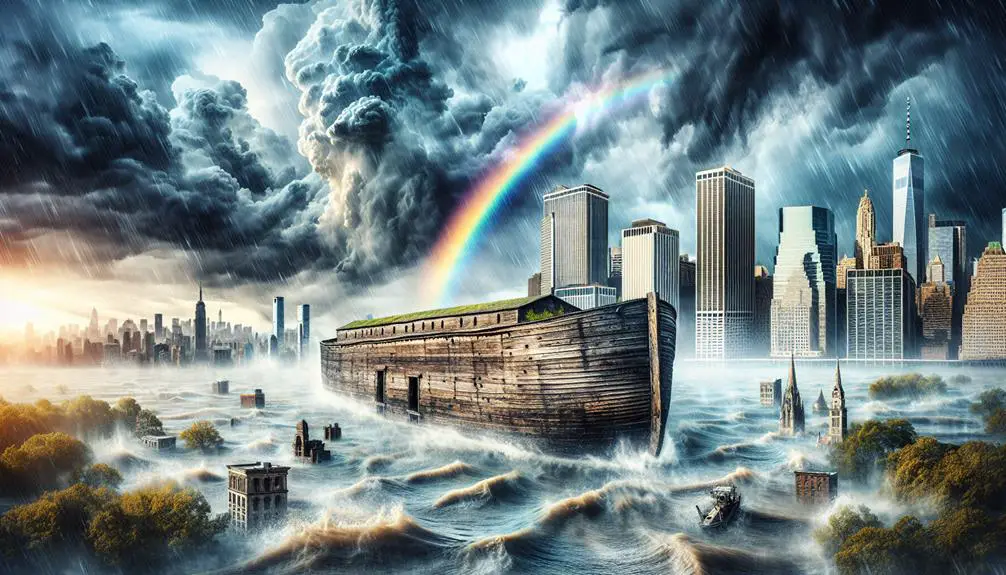
Throughout biblical narratives, the concept of 'Signs of the Times' serves as a critical lens through which humanity's alignment with divine will is scrutinized and understood. In the context of today's world, this lens highlights two pivotal developments: global warming and the advent of modern technology. Both phenomena, while vastly different, share an underlying capacity to fundamentally alter human life and our planet.
Sign of the Times |
Impact |
|---|---|
Global Warming |
Rapid climate change, including rising sea levels and extreme weather events, threatens ecosystems and human societies alike. |
Modern Technology |
Advances in technology have reshaped every aspect of human existence, from communication to healthcare, often outpacing our ability to understand their long-term consequences. |
Connectivity |
While modern technology has connected the world in unprecedented ways, it also presents challenges to privacy and mental health. |
Automation |
The rise of automation and artificial intelligence poses questions about the future of work and economic disparities. |
Information Overload |
The digital age has led to an overwhelming abundance of information, making discernment and truth-seeking more challenging. |
Analyzing these signs requires a nuanced understanding that transcends simplistic interpretations. Global warming, for instance, is not merely an environmental issue but a moral one, calling into question humanity's stewardship of the Earth. Similarly, the rapid advancement of modern technology forces a reevaluation of ethical boundaries and social responsibilities.
In essence, these signs of the times are not just indicators of change but prompts for introspection. They compel you to consider how your actions align with broader moral and ethical frameworks, urging a reexamination of what it means to live responsibly in a rapidly evolving world.
Divine Warnings Ignored
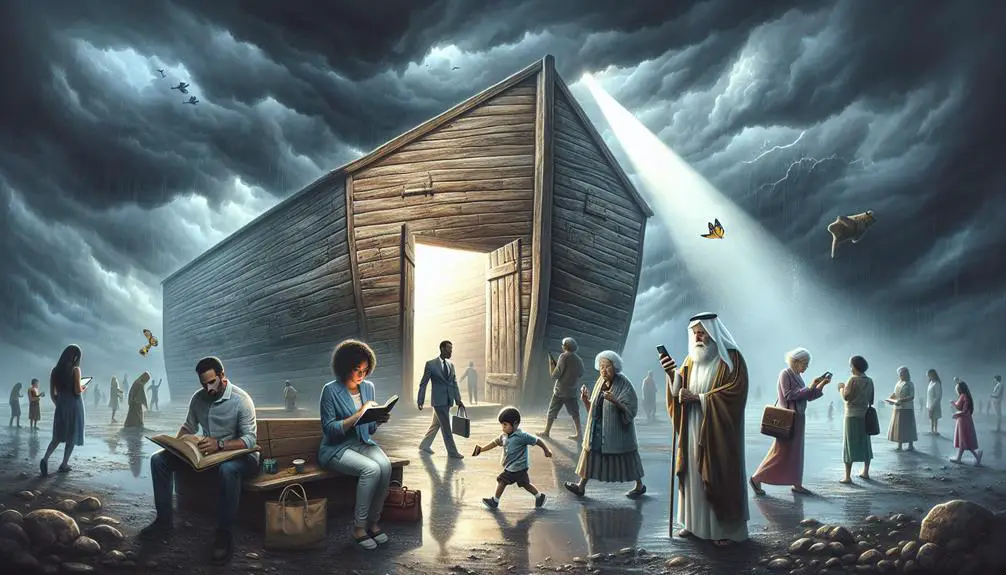
Historically, humanity has often overlooked divine warnings, a negligence that bears significant consequences for our collective future. This disregard isn't an anomaly of the past but continues into the present, where modern skepticism often challenges the plausibility of these cautions from the divine. You see, the narrative of ignoring divine warnings isn't confined to ancient texts; it's a recurring theme that echoes through the annals of history, providing us with valuable lessons on the perils of ignoring signs meant to guide and protect us.
The parallels between historical accounts and contemporary attitudes towards divine warnings are striking. In both eras, there exists a tendency to dismiss or rationalize these warnings, attributing them to natural phenomena or coincidences. This skepticism isn't merely a rejection of the supernatural; it's a reflection of a broader cultural shift towards secular rationalism, where empirical evidence reigns supreme, and anything beyond its scope is met with doubt or outright denial.
However, this modern skepticism overlooks an essential aspect of divine warnings: their purpose isn't to invoke fear but to prompt reflection, repentance, and ultimately, transformation. Historical parallels remind us that these warnings serve as a beacon, guiding humanity towards a path of moral and spiritual renewal. Ignoring them not only jeopardizes our immediate well-being but also sets a precarious course for future generations, who'll inherit the consequences of our choices.
In essence, the challenge lies not in deciphering the divine warnings but in overcoming the skepticism that blinds us to their significance.
Faith Amidst Judgment
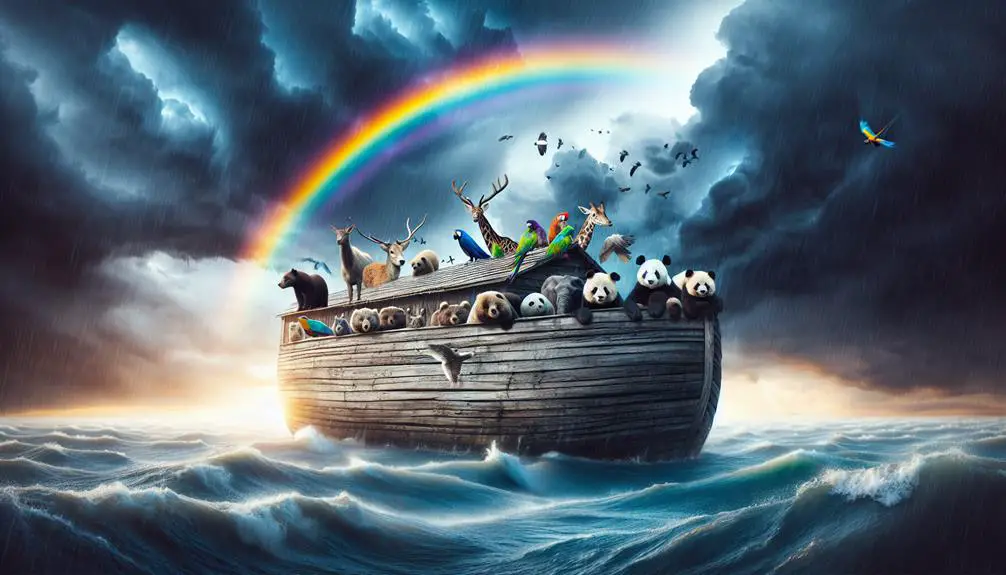
You observe that amidst the overarching narrative of judgment during Noah's time, a nuanced exploration of faith's role becomes imperative.
Noah's unwavering faith, as depicted in surviving through obedience and fostering hope beyond judgment, serves as a cornerstone for understanding divine-human interactions in this context.
This analysis allows you to appreciate the complexity of faith as both a refuge and a means of salvation in times of divine retribution.
Noah's Unwavering Faith
Amidst the impending judgment of a corrupt world, Noah's unwavering faith serves as a profound testament to his righteousness and trust in divine commands. His commitment is most evident in Noah's construction of the ark, a monumental task that he undertakes without hesitation, aligning his actions with God's instructions.
This endeavor not only showcases his obedience but also his leadership within his family dynamics. Noah's family becomes an integral part of this divine mission, supporting the construction process and adhering to Noah's faith-driven guidance. This period highlights the intersection of personal conviction and collective action, underscoring the importance of familial unity in fulfilling divine mandates.
Noah's steadfast belief amidst widespread disbelief sets a precedent for faithfulness and resilience in the face of daunting challenges.
Surviving Through Obedience
Building on Noah's unwavering faith, his survival through obedience exemplifies the profound impact of faith in judgment, setting a cornerstone for understanding divine expectations and human resilience. This narrative underscores the necessity of moral resilience in the face of societal decadence.
Noah's adherence to divine directives, amidst widespread moral collapse, highlights a critical pathway for cultural adaptation that prioritizes ethical integrity over prevailing social norms. His story teaches you the importance of maintaining steadfastness in one's convictions, even when such stances diverge sharply from mainstream societal behaviors.
Through Noah's example, it becomes evident that survival in times of divine judgment is less about the physical act of obedience and more about the moral and spiritual fortitude that underpins such actions.
Hope Beyond Judgment
In the narrative of Noah, hope emerges as a pivotal theme, illustrating the potential for renewal and redemption beyond the scope of divine judgment. This account extends beyond mere survival, delving into the depths of eternal redemption and transformative grace.
Through Noah's faith and obedience, one discerns a profound lesson: amidst overwhelming judgment, a pathway to restoration and hope remains accessible. The story underscores that divine judgment isn't the final word; rather, it's an invitation to embrace transformative grace.
This grace, in its essence, offers a chance for eternal redemption, a concept deeply embedded within the fabric of faith traditions. Thus, the narrative of Noah not only recounts a historical event but also serves as a timeless metaphor for hope and renewal in the face of judgment.
God's Covenant With Humanity
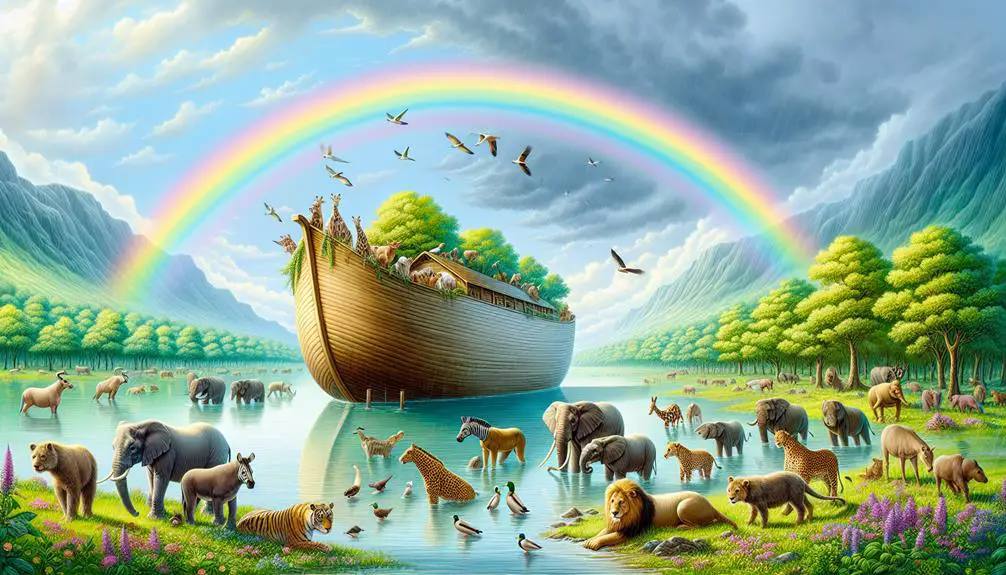
God established a covenant with humanity, promising never to destroy the earth with a flood again, marking a pivotal moment in biblical narratives. This covenant, often symbolized by the rainbow promise, emerged as a beacon of hope and assurance after the devastation of the global flood. The narrative, deeply embedded in the fabric of Judeo-Christian tradition, underscores a fundamental shift in the divine-human relationship, emphasizing mercy and grace over judgment.
Analyzing the covenant's context reveals its dual significance. Firstly, it represents a divine commitment to the stability and predictability of the natural world. The aftermath of the flood left the earth in a state of renewal, with the rainbow promise serving as a sign of God's restraint and a guarantee of seasonal continuity. This aspect of the covenant underscores a universal concern for creation, extending beyond the immediate narrative to encompass a broader theological perspective on God's providence.
Secondly, the covenant with Noah establishes a framework for subsequent covenants in biblical history, setting a precedent for the concept of a bilateral agreement between the divine and humanity. This introduces a paradigm wherein human action and divine promise are intricately linked, suggesting that divine covenants often entail human responsibilities.
Critically, this covenant doesn't only symbolize a promise to refrain from catastrophic judgment but also invites reflection on divine mercy and the human capacity for renewal. It serves as a foundational element in understanding the nature of divine promises, highlighting their enduring relevance and the expectation of mutual fidelity.
Lessons for Today
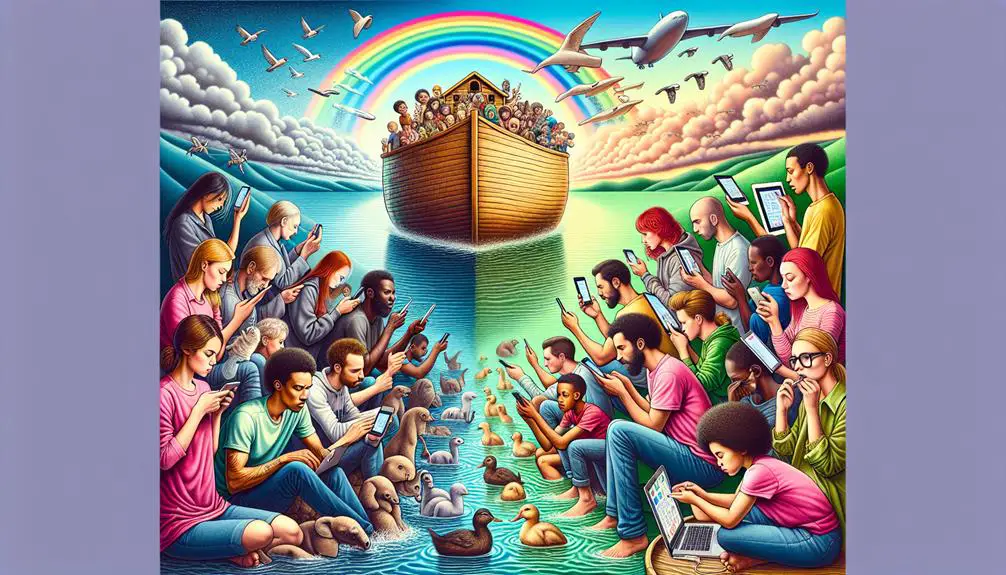
Reflecting on the covenant established with Noah, we often overlook its profound implications for contemporary ethical and spiritual practice. This narrative, rich in lessons, offers a lens through which to view modern morality and environmental stewardship, urging us to reconsider our actions and their impact on the world.
The story of Noah calls for a holistic understanding of our place within creation, emphasizing the need for harmonious living with the environment. It's not merely about survival but about fostering a relationship built on respect and care. The covenant, symbolized by the rainbow, serves as a perpetual reminder of our responsibilities towards the Earth and each other.
Aspect |
Biblical Context |
Contemporary Implication |
|---|---|---|
Stewardship |
Noah's role as a caretaker of creation |
Advocacy for sustainable living |
Morality |
Righteousness in a corrupt world |
Upholding integrity in face of modern challenges |
Community |
Preservation of human and animal life |
Promoting inclusivity and cooperation |
Covenant |
Promise between God and humanity |
Understanding commitments to future generations |
Reflection |
Noah's contemplation and action |
Encouraging thoughtful responses to ethical dilemmas |
In this era, where environmental degradation and ethical ambiguity often headline the news, the narrative beckons us to act judiciously and with foresight. It's a call to not only reflect on our personal and collective morality but also to engage actively in environmental stewardship. The covenant with Noah isn't an archaic or isolated event; it's a foundational element for constructing a more responsible and ethically aware society.
Frequently Asked Questions
How Has the Interpretation of the "Days of Noah" Narrative Evolved in Different Christian Denominations Over Time?
You've noticed how interpretations of this narrative vary widely among Christian denominations over time.
Eschatological comparisons often spark denominational controversies, with some viewing it as a metaphor for the end times, while others see it as a historical account with moral lessons.
This divergence reflects broader theological debates and underscores the complexity of biblical interpretation, showing how deeply beliefs can influence one's understanding of scripture and its implications for today's world.
What Are the Archaeological and Historical Evidences That Support or Refute the Literal Existence of Noah and the Global Flood?
You're looking into the evidence surrounding a massive flood and the existence of a figure like Noah. In your search, you'll find that flood geology and genetic bottleneck concepts are pivotal.
However, most scholars argue there's scant archaeological proof of a global flood or a genetic bottleneck that would point to such an event. These findings challenge the literal interpretation of ancient texts, pushing for a more metaphorical or symbolic understanding.
How Do Other Religious Traditions Outside of Christianity View the Story of Noah and the Flood?
Exploring the story of Noah, you'll find that 72% of world religions share flood narratives.
Specifically, Islamic perspectives honor Noah as a prophet, emphasizing his role in a divine mission, while Hindu interpretations symbolize the story more metaphorically, focusing on themes of creation, destruction, and morality.
Analyzing these views, you'll see a fascinating blend of convergence and divergence from the biblical account, reflecting a rich tapestry of global mythological and religious thought.
In What Ways Have Modern Environmental Crises and Climate Change Been Compared to the "Days of Noah," and What Criticisms Exist of Such Comparisons?
You might've heard modern environmental crises and climate change likened to Noah's prophecy, drawing modern parallels to those ancient warnings. Critics argue that such comparisons oversimplify complex issues, potentially downplaying human accountability and the urgency for action.
They emphasize that, unlike the narrative of inevitable divine intervention, today's challenges demand proactive, human-led solutions. This debate highlights the intersection of religious metaphor and contemporary environmental ethics.
How Has Popular Culture (Films, Books, Art) Depicted the "Days of Noah," and What Impact Has This Had on Societal Understanding of the Biblical Story?
Ironically, you're living in an era where Noah's legacy isn't just preserved in ancient texts but is vividly brought to life through cinematic interpretations. These depictions, ranging from blockbuster films to nuanced pieces of art, haven't only entertained but also shaped your understanding of this biblical narrative.
Conclusion
In conclusion, like a lighthouse standing firm amidst turbulent seas, the story of Noah and the flood serves as a beacon, guiding humanity through the tempests of moral decay and divine judgment.
By analyzing this narrative, you're reminded of the importance of heeding divine warnings, the value of faith in times of trial, and the enduring nature of God's covenant with humanity.
Today, these lessons remain as relevant as ever, urging you to live with integrity in an often tumultuous world.

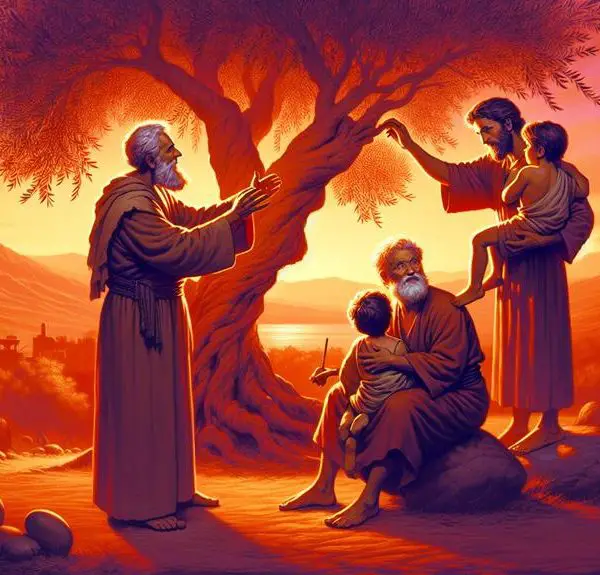
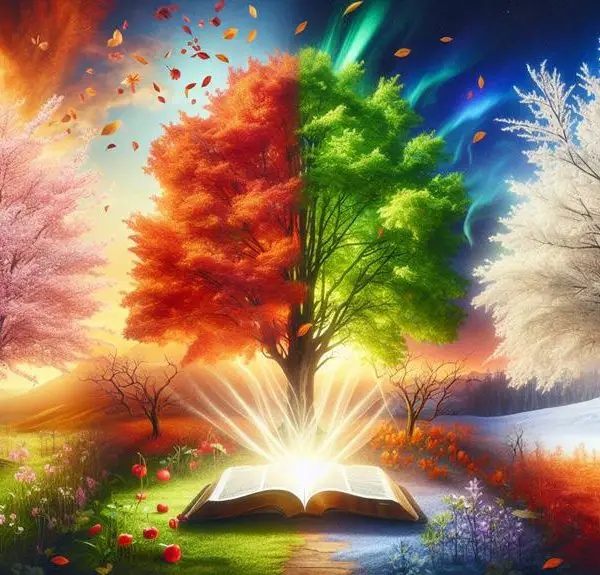
Sign up